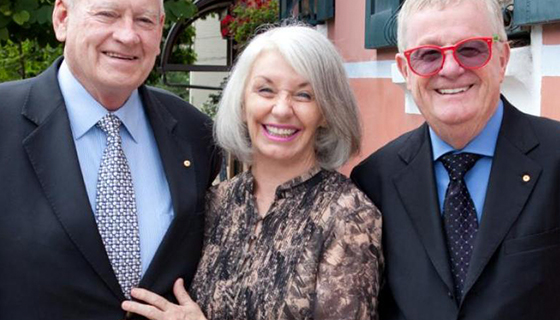Philanthropist funds Indigenous health leadership
Future Aboriginal and Torres Strait Islander health professionals have the opportunity for leadership development in health policy and practice thanks to a $10 million gift from leading Australian philanthropist, Greg Poche AO.
 Future Aboriginal and Torres Strait Islander health professionals have the opportunity for leadership development in health policy and practice thanks to a $10 million gift from leading Australian philanthropist, Greg Poche AO.
Future Aboriginal and Torres Strait Islander health professionals have the opportunity for leadership development in health policy and practice thanks to a $10 million gift from leading Australian philanthropist, Greg Poche AO.
Despite recent improvements to health outcomes for Indigenous Australians, more needs to be done to close the gap. For Indigenous people born between 2005 and 2007, life expectancy is estimated to be 67.2 years for males and 72.9 years for females – around 10-11 years less than non-Indigenous Australians.
Mr Poche and his wife Kay are committed to doing their best for Indigenous Australians. “Improving the health and wellbeing of Indigenous Australians is one of our nation’s biggest challenges and it is vital that we do everything we can,” Mr Poche said.
Mr Poche – who has donated more than $115 million to causes around Australia, including over $40 million towards improving health outcomes for Aboriginal and Torres Strait Islander people – is the founder and former owner of Star Track Express.
The University of Melbourne Poche Centre for Indigenous Health joins sister Poche centres at the University of Western Australia, Flinders University in Adelaide and the University of Sydney. The goal of Poche centres around Australia is to contribute significantly to improved Aboriginal and Torres Strait Islander health and to close the gap in health outcomes between Aboriginal and non-Aboriginal people.
Associate Dean (Indigenous Development) at the Faculty of Medicine, Dentistry and Health Sciences at the University of Melbourne, Associate Professor Shaun Ewen, said the gift is an investment in the future health of our nation, and will play a critical role in closing the health gap between Indigenous and non-Indigenous Australians.
“To make real, long-term gains in Indigenous health, we need leadership from highly skilled, well-qualified Indigenous people who are able to mobilise action and build an agenda for change in their areas of health practice,” Professor Ewen said.
“The mission of the University of Melbourne Poche Centre for Indigenous Health is to develop the next generation of Indigenous leaders who will influence the strategic directions of institutions, be mentors for emerging Indigenous leaders, build enduring partnerships and influence the health outcomes of Australia so that the gap in health status between Indigenous and other Australians is closed.”
In addition to its rigorous training programs, the Centre provides support to meet the needs of future Indigenous health leaders as they undertake their PhD qualifications and postdoctoral fellowships at the University of Melbourne. The Centre, along with the Faculty of Medicine, Dentistry and Health Sciences, aims to achieve twenty new PhD enrolments for Indigenous people in health by 2020.
Vice-Chancellor of the University of Melbourne, Professor Glyn Davis, said that improving the health and wellbeing of Australia’s first people is of vital importance to the University of Melbourne.
“This transformational gift adds significantly to our capacity in this critical area of work,” Professor Davis said.
“We are truly inspired by the Poche family’s generosity and commitment to Indigenous health.”
(pictured: Greg Poch, Kay Van Norton Poche and friend Reg Richardson)